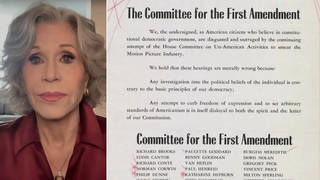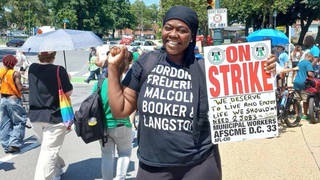
The United Auto Workers union has reached tentative agreements with Ford, Stellantis and General Motors, and workers are returning as they end a historic six-week strike against the Big Three automakers based in Detroit. Under the deals, workers will get major raises over the length of the contracts, as well as improved benefits. “They will be life-changing for some of the lowest-paid members of the union,” says legendary labor journalist Jane Slaughter, founder of Labor Notes. The UAW’s success is largely attributed to union president Shawn Fain’s “stand-up strike” strategy, in which workers walked off the job at more locations each week in response to lack of progress at the bargaining table. Fain is part of a new wave of reformist leaders who were intent on reversing losses from the Great Recession, when the union made historic concessions to keep the car companies afloat. “None of this would be happening if it were the old UAW,” says Slaughter.
Transcript
AMY GOODMAN: This is Democracy Now!, democracynow.org, The War and Peace Report. I’m Amy Goodman.
In a major victory, the United Auto Workers announced Monday they reached a tentative agreement with General Motors, following deals with Ford and Stellantis last week. This brings an end to the UAW’s historic 46-day-long strike against the Detroit Big Three automakers. UAW President Shawn Fain addressed members on Monday.
SHAWN FAIN: We have won record agreements at Ford, Stellantis and now GM. We have united our membership like never before. We have shown the companies, the American public and the whole world that the working class is not done fighting. In fact, we’re just getting started.
AMY GOODMAN: On Monday, Democracy Now! spoke to Scott Houldieson, a member of UAW Local 551, works at Ford’s Chicago Assembly Plant, is on the steering committee, chair of Unite All Workers for Democracy, the union’s reform caucus.
SCOTT HOULDIESON: Our plant was part of the third round of stand-up strikes. And the strategy was to, you know, kind of play one company off the other, looking for better terms. It is a new strategy. In the past, they’ve targeted one company and negotiated with them, while the others were on hold. But the stand-up strike also had an inside strategy, where workers that were still on the job at different plants were instructed to refuse voluntary overtime and try to work to the letter of the contract, so that they would kind of slow things down for the company at the plants that were running. So there was an inside/outside strategy to that.
AMY GOODMAN: So, that’s Scott Houldieson.
For more, we’re joined in Detroit by Jane Slaughter, founder of Labor Notes, where she’s covered the auto industry since 1979. Before that, she was briefly an autoworker. She’s the author of many books, including Secrets of a Successful Organizer. Her recent piece in Jacobin is headlined “We Can Thank a Union Reform Caucus for the Militant UAW Strike.”
So, Jane, welcome to Democracy Now! Tell us what you understand these deals entail.
JANE SLAUGHTER: They entail a whole lot of money. They will be life-changing for some of the lowest-paid members of the union, the so-called temps, who actually work for years, although being called temps. These people who are now making $17, $18, $19 an hour, within four years, they’ll be making over $40 an hour. So, the union made a huge effort to bring its lower-paid members up and to get rid of the nefarious tiers that have been dividing the workforce in auto since 2007, 2009.
AMY GOODMAN: And how do they accomplish this?
JANE SLAUGHTER: By striking and by organizing the members. The new administration has really only fully been in power since late March, but they immediately set out to try to get members involved, in a way they’ve never been before, in letting the companies know that they were willing to strike and ready to fight to bring their wages up and undo some of the other injustices that have happened over the years. So, they got members doing things they called practice picketing. They’d have demonstrations outside the plants. They had everybody wearing red shirts in the plant as just a signal to management that we’re all unified here. It was really unprecedented in this union that the members would be organized to let their feelings be known to the companies.
AMY GOODMAN: And if you can talk about, Jane, who Shawn Fain is? You know, the headline of your piece, “We Can Thank a Union Reform Caucus for the Militant UAW Strike.” Explain how this new leadership came into power.
JANE SLAUGHTER: Yes. None of this would have been happening if it were the old UAW. Top UAW leaders were caught in very egregious corruption. Thirteen of them went to jail, including two presidents, for embezzlement and other crimes, dealing with the companies in an unprincipled way. And the government stepped in and gave the members the opportunity to decide that they wanted to be able to choose their top leaders, rather than them being chosen, as in the old system, just at a convention that was very tightly controlled. So, once the members had the right to vote on their top officers, they voted in this new slate.
Now, this slate, it was called UAWD, Unite All Workers for Democracy. It was formed in 2019, expressly with the purpose of trying to get the right to vote. They won. They ran seven candidates for the executive board. They were all elected. And once they had a majority on the executive board, things could start changing from the top, encouraging the members also to change things from the bottom.
AMY GOODMAN: And can you talk about the strategy used, the stand-up strikes?
JANE SLAUGHTER: Yes. This was a way to keep the companies off balance. And, boy, did it work. To me, it seemed like management just had no idea how to respond to this new strategy. They were used to a very ceremonial, ritualistic process of bargaining. It was the same every time. This time, Shawn Fain, the president, said, “We are going to not let you know what we’re going to be doing next.”
And so, they would call strikes at — who knew which plant it was going to be? Three plants just to start with, then they added in a bunch of smaller facilities. Then, each week new plants would be added. And if a company was cooperating and actually giving in some things at the bargaining table, then they might not get struck that week. But if they were being recalcitrant, then they would get struck. And then, towards the end, the union pulled out its really big guns and struck the most profitable plants, and that’s when the companies caved.
AMY GOODMAN: And what does the vote — when does that take place? In fact, people are going back to work.
JANE SLAUGHTER: They’re going back to work. The vote will take place sometime over the next two, maybe three weeks.
AMY GOODMAN: And what about places like Tesla, that are nonunion?
JANE SLAUGHTER: Well, it was just announced that there exists, has already been in existence, an organizing committee at Tesla. The union very much, of course, wants to organize Tesla, but also all the other many, many, many nonunion auto plants that exist now. As you know, Toyota, Mercedes, BMW, Nissan, many others have set up, mostly in the South. All those plants are nonunion. And now, in my view, there’s going to be a tremendous incentive for those workers to join the union, once they see what’s in the contract.
AMY GOODMAN: Well, Jane Slaughter, we’re going to have to leave it there, founder of Labor Notes. Thanks so much for joining us. I’m Amy Goodman. This is Democracy Now!












Media Options